 Go to NEWSLETTER BACK ISSUES
Go to NEWSLETTER BACK ISSUESGo to ARTICLE INDEX
Load Acrobat Version
"As the Father has sent me, I am sending you." (John 20:21)
The REVEILLE EQUIPPER First Quarter 2005, Vol. 9 No. 1
- Feature: Service Personnel Straddle Culture Gap
- News: Tsunami Brings Epic Changes to Islam in Indonesia
- Feedback: Letter from an Expatriate Friend in Aceh
- News: Iraq Needs Religious Freedom Too
- Profile: Spiritual Landscape of Iran
- Agency Profile: Iranian Christians International
- Opportunity: Retire into Missions
- Resource: Learn About Islam in 14 Pages
- Book Reveiw: Reading Lolita in Tehran
- Muslim Studies in 2005
Feature:
Service Personnel Straddle Culture Gap
by Dr. Bruce Sidebotham
For much of the world, choosing one’s god makes about as much sense as
choosing one’s mother and father.
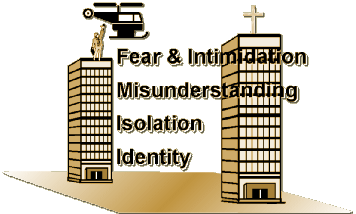
In the ideological struggle for Iraqi and Afghan stability, service personnel are not just between the proverbial rock and hard place. They are like a man with each foot on the roof of a different skyscraper. Residents of these buildings interact in global markets, in state universities, in foreign exchange programs, and may even rub shoulders at Wal-Mart, but they are loyal to two distinctly separate cultures. The gap between them is most apparent from the top-story window on the level of fear and intimidation.
Yul boarded with family friends and attended high school in the provincial capital because her village school was immensely inferior. Devout and loyal, she read in her “Holy” Quran that Jesus would be the judge on the last day. Thinking it might help if she knew the judge, she visited a church. Later she became a Christian and was baptized.
Hounded from her village during a school break, she was told never to return. Radio spots and newspaper ads warned people not to talk to her. Yul’s conversion brought economic collapse to her entire family even though they had disowned her, because the villagers boycotted her father’s stall in the local market.
Soni told me he wanted to be a Christian but he couldn’t. I gave him a New Testament in the national language that he had learned in school. Secretly, he read it daily. One day, he returned from work at the barber shop to find his clothes, audio tapes, and boom box cast out into the street. A member of the family in the house where he boarded had found the Scriptures under his pillow.
Stephanus, a Pentecostal evangelist, never regained consciousness. When I saw him in the hospital, his face was swollen like a black and blue grapefruit. His arms had burns that the nurses said were from cigarettes and electric wires. A week earlier, he had been taken into police custody for allegedly burning a copy of the “Holy” Quran.
The intimidation and fear I have observed, in which parents may kill their own children and terrorists will slaughter their own countrymen, protrudes from the civil affairs skyline like a tower on a skyscraper. The tower however, does not float in space. This hostility rests upon misunderstanding.
 Missionary author and speaker Don Richardson tells of a family who went to live among a primitive tribe in Irian Jaya to learn their unwritten language and translate the Scriptures. The father traveled ahead to prepare a home for his wife and infant. Their first meal together in their native-style dwelling feasted many curious eyes through unscreened and unshuttered windows. Food from cans made quite a commotion. The natives rapidly understood that carrots came from the can with the picture of carrots and corn came from the can with the picture of corn, so they quite naturally assumed with attendant horror that the baby was being fed mashed infant.
Missionary author and speaker Don Richardson tells of a family who went to live among a primitive tribe in Irian Jaya to learn their unwritten language and translate the Scriptures. The father traveled ahead to prepare a home for his wife and infant. Their first meal together in their native-style dwelling feasted many curious eyes through unscreened and unshuttered windows. Food from cans made quite a commotion. The natives rapidly understood that carrots came from the can with the picture of carrots and corn came from the can with the picture of corn, so they quite naturally assumed with attendant horror that the baby was being fed mashed infant.
How might Americans feel listening to a sermon delivered by a man wearing lipstick and eye shadow? Imagine participating in worship led by a praise team in bikini bathing suits.
Muslim are born into religion the way Americans are born into citizenship. At early ages they learn that Christians are idolaters, that Christians worship three gods – a father, a mother, and a son, and that Christians pray to these idols. Glancing through an open door of some churches confirms these impressions. Above the altar hangs the image of a brutally beaten, mostly naked, bleeding man. The casual observer may think, “So that’s the way they blaspheme with their irreverent idols.”
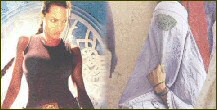 From childhood Muslims learn that Christianity undergirds all kinds of moral decadence. Evidence for this broadcasts throughout the world on movie posters and in TV shows. In the Jakarta airport I watched a nearly naked woman sing about sex and dance suggestively. If Madonna were no longer a Christian she would have changed her name as did Cassius Clay and Lou Al Cinder.
From childhood Muslims learn that Christianity undergirds all kinds of moral decadence. Evidence for this broadcasts throughout the world on movie posters and in TV shows. In the Jakarta airport I watched a nearly naked woman sing about sex and dance suggestively. If Madonna were no longer a Christian she would have changed her name as did Cassius Clay and Lou Al Cinder.
Wandering through the street on a Sunday morning a Muslim might hear rock music, singing, and clapping floating on the air from a contemporary service. A local vendor might tell him how on Saturday youth nights the boys and girls mingle and party.
When reading a tract about Jesus Christ who died so that sinners can go to heaven by just believing in him, a Muslim might think, “No wonder the Christians are so decadent. Have they no sense of justice or moral responsibility?”
Imagine the head of an extended household responsible for the health, welfare, and moral development of not only his own children but also his nieces and nephews. Imagine one of his charges returning from boarding school as a practicing homosexual, intent on sharing all the pleasures and wonders of his or her newfound lifestyle and determined to make converts from within the extended family. Imagine the pain and hard decisions that follow over the child’s refusal to abandon this new found fanaticism. That approximates the pain and fear a Muslim household experiences when a member departs Islam.
But how does such misunderstanding of Christian symbols and practice thrive? It rests upon the level of isolation.
People gravitate towards others like themselves and avoid groups in which they may be misunderstood. How many truly integrated churches are found even in America?
The United States has been called a melting pot of different cultures, but even in America the races and religions segregate themselves. Evangelical Christians form their own schools, radio stations, publishers, baby sitting groups, and softball teams. Non-Christians “fellowship” in night clubs. If it’s so easy for Christians and non-Christians to isolate themselves from each other even in the United States, how much more so in a context where the resultant misunderstanding often erupts in violence?
Negative experiences of prejudice and persecution, while they may intensify segregation, are symptoms rather than the cause of isolation or the reason it continues. Isolation’s source is deeper than friction in interpersonal relations. The isolation that supports misunderstanding which results in intimidation and fear is founded on identity.
A big striped cat is a tiger. One with spots is a leopard. Two hundred years ago in America, a black-skinned person was a slave. For much of the world, choosing one’s god makes about as much sense as choosing one’s mother and father.
Few mental forces are as powerful as self perception. Few social forces are as powerful as nationalism and ethnic pride. They shape the clothes we wear, the food we eat, the language we speak, and the lifestyle we pursue. Great wars have been fought and nuclear weapons created to defend certain kinds of identity. Perhaps, nearly all warfare is ultimately tribal.
Most of the world is “tribal.” Europe contains French, English, Spanish, German, Dutch, Basque, and other ethnic groups. Rwanda splits between the Hutus and Tutsis. What was once Yugoslavia has degenerated into rival ethnicities. India and China contain more ethnic identities than some continents. Indonesia boasts over 300 major languages and at least three independence struggles that are being contained by “national police.”
Harvard professor Samuel P. Huntington says, “. . . flags count and so do other symbols of cultural identity, including crosses, crescents, and even head coverings, because culture counts, and cultural identity is what is most meaningful to people” (The Clash of Civilizations, 1996, p. 20). He also says, “People define themselves in terms of ancestry, religion, language, history, values, customs, and institutions. They identify with cultural groups: tribes, ethnic groups, religious communities, nations, and at the broadest level, civilizations . . . . We know who we are only when we know who we are not and often only when we know who we are against” (p. 21).
Insecure identity feeds much of the fear and hostility soldiers are encountering, and it is the greatest obstacle to peace.
The biggest cultural separation to have ever existed is between God and man. Between God and man are the same barriers that we find between cultures.
Fear and intimidation appears most prominently. After Adam sinned he said to God, “I heard you in the garden, and I was afraid” (Gen. 3:10). Paul writes that in our pre-Christ condition we were “foreigners and aliens” (Eph. 2:12).
Misunderstanding drives man’s fear. “The natural man does not receive the things of the Spirit of God, for they are foolishness to him; nor can he know them, because they are spiritually discerned” (1Cor. 2:14 KJV).
Isolation drives man’s misunderstanding. Paul says men are “darkened in their understanding and separated from the life of God because of the ignorance that is in their hearts” (Eph. 4:18).
Separation from God results from man’s fallen identity. Isaiah writes, “Your iniquities have separated you from God; your sins have hidden his face from you” (Is. 59:2). Adam hid from God because of his condition, “I was afraid because I was naked” (Gen. 3:10).
To bring us to peace with himself, God passed through each of these levels (John 1:10-14). He became a man (level 1 - identity) and dwelt among us (level 2 - isolation) so that we could behold his glory (level 3 - understanding) and become children of God (level 4 - fear & intimidation).
God provides the model for crossing cultural barriers. It is his own incarnation. As they straddle the skyscrapers of different civilizations, service personnel not only recapitulate Christ’s incarnation, they also experience similar suffering and sacrifice. Ultimately Christ is the source for peace in all race relations. In him we share a new identity and camaraderie so infinite that all others should pale in comparison and lose their divisive power.
News:
Tsunami Brings Epic Changes to Islam in Indonesia
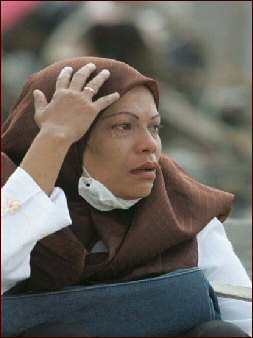 Because I spent nearly seven years on Sumatra just a few hundred miles from the epicenter of the recent tsunami- causing quake, my perspective may be unusual. This disaster is not only epic for its proportions, but also for the political and geographic changes that will result.
Because I spent nearly seven years on Sumatra just a few hundred miles from the epicenter of the recent tsunami- causing quake, my perspective may be unusual. This disaster is not only epic for its proportions, but also for the political and geographic changes that will result.
Long before 9-11, a close friend recounted to me his late night experience in Aceh of watching dugout canoes ferry rifles and grenades from a ship offshore. He told me of conversations at a remote jungle camp with young men being trained to use those weapons by other young men from Afghanistan.
Aceh has been to the country of Indonesia what the city of Falusia is to Iraq, what the strip of Gaza is to Israel, what the province of Chechnya is to Russia, and what the country of Afghanistan used to be for the world. Indonesians call it “the veranda of Mecca.” Since the downfall of former President Suharto, Aceh has become more than just Indonesia’s most fundamentalist province and a safe haven for insurgents. As Indonesia’s only province under shari’a Muslim law, the methods used to win autonomy and concessions have become an inspiration and model for extremist movements elsewhere which bomb hotels, burn churches, and cleanse villages of their Christians.
I would never say that this natural disaster falling upon Aceh is a divine “judgment,” but this “act of God” will profoundly affect the appeal and exportability of extremism from Aceh. Fundamentalist clerics in Aceh may be saying this tragedy happened because their people need to be more devout and less compromising, but what will less extreme Muslims elsewhere who were spared from this disaster be thinking about divine approval?
Ted Haggard, who presides as President over the National Association of Evangelicals and pastors New Life Church in Colorado Springs, said about the tsunami on 2 January, “I’m not talking about judgment. I'm talking about a great opportunity, an opportunity unlike any time in the last thousand years.”
Massive aid and even military spending on Aceh meets more than just humanitarian concerns. It addresses strategic concerns for global peace and security too.
Feedback:
Letter from an Expatriate Friend in Aceh
Dear Bruce,
Every chance I get I thank the military for their efforts in helping in Aceh.
The biggest thing God is putting in our hearts is to simply do everything that we can to help as many people as possible get their lives back into some type of routine or as “normal” as things can be.
Hundreds of thousands are homeless, traumatized, grieving, confused and left without any resources. The immediate needs of food, water, and temporary shelter have largely been met or are being met. Long-term needs include rebuilding homes and businesses, reestablishing economic infrastructure (employment, availability of goods, etc.), and dealing with the psychological impact on survivors.
This is a tremendous opportunity for Christian agencies and individuals in sensitive ways to be a practical witness of love and compassion. Our response will continue to extend the Kingdom of God.
Often when asking the local people what is their greatest need at this time, they say it is hope. Severe yet understandable problems from hopelessness and despair are rampant.
Doing all we can, giving our best seems so small and insignificant compared to the task at hand.
So much of my family and team’s lives have been invested here. I have fond memories of the people and the amazing natural beauty. My youngest daughter and the children of other ministry team members were born here. Most of our best friends in the world lived here. For many years our lives revolved around the fact that God had called us to love and serve this people, giving them in any way possible an opportunity to hear of the Good News. We pray that the difference we are able to make in a few lives will have an eternal effect.
Much prayer is needed for planning and preparing the next moves. For the most part we are helping people restore their lives. The infrastructure and economy seem to be where God has opened some doors at this point.
Pray that there would be unity and oneness of heart in where we go from here. The opportunities before us are tremendous, but so are the temptations.
Our family is doing well. In spite of my having been away most of the time since Christmas, the children are doing well. I give credit to God’s grace which we have experienced as never before.
At this time we are receiving two types f donations. The first is for our ministry team of fifteen who were caught in the disaster. Several have lost everything. We are doing what we can to help them recover. The second is for larger scale development and reconstruction projects.
Donations to help the team can be sent to: Church Upon the Rock, 7901 Red Oak Drive, Mounds View, MN 55112-5922.
Donations for development and reconstruction can be sent to: New Horizons International Inc., 11848 Monroe St. NE, Blaine, MN 55434; telephone (763) 757-4430.
Please specify for Aceh disaster relief. A specific audited breakdown will be available to those who donate later this year.
Love, G-
News:
Iraq Needs Religious Freedom Too
by Elizabeth Kendal
World Evangelical Alliance Religious Liberty News & Analysis
Roula Khalaf, writing for the Financial Times, correctly points out now that Iraq’s “first pluralist elections in 50 years” are over, “the more decisive battle for the future of Iraq is just beginning.” [1]
In a 27 December 2004 letter entitled, “To the Muslims in Iraq in Particular and The [Islamic] Nation in General”, Osama bin Laden defined the present conflict as “a fateful war between unbelief and Islam, between the army of Muhammad, the army of belief, and the people of the cross...” (MEMRI 30 Dec 2004).
Iraq’s “people of the cross” (a religious not ethnic identity), along with other “unbelievers” – Mandaeans, the remaining Jews, and other minorities – need both constitutional and legal guarantees of equality and protection, and the enforcement of those rights. Failing this, they may need a protected safe-haven.
Mandaean Community Harassed
The Sabian Mandaean Association of Australia (SMAA) reports that attacks against the Mandaean community have intensified since Christmas. (Mandaeans follow the teachings of John the Baptist concerning righteousness and repentance, but reject Jesus as Messiah.) Several significant religious leaders and family members have been assassinated with the express purpose of shattering the community and driving them out of Iraq.
One such assassination reported to the SMAA was that of Mr Riadh Radhi Habib, President of the Mandaean Supreme Spiritual Council, Basra Branch, who was murdered on Sunday evening 16 January 2005.
According the received report, “Mr Riadh Radhi Habib was walking to his car with his children when he was approached by three men armed with machine guns who demanded that Riadh Radhi Habib convert to Islam. When he refused, the Muslims fired one shot into Riadh Radhi Habib in front of his children. Riadh Radhi Habib fell to the ground. His children threw themselves on to him. The Muslims then dragged the children off and then fired more than ninety shots into his body, shooting it to pieces in front of his children.”
The SMAA has provided a long and detailed list of attacks that were reported between Christmas and mid-January. These attacks were always accompanied by demands to convert to Islam. Several victims have survived gunshot wounds to the chest. Several others were kidnapped or managed to escape attempted kidnappings only to be forced into hiding. In each of the kidnap cases reported to SMAA, ransom money was not accepted, and in some cases not even requested – the kidnappers demanded conversion to Islam.
The SMAA reports: “On 3 January 2005, Muslims in Baghdad kidnapped the Mandaean ishkander (deacon) Hadi Salem Al-Zohairy who comes from a devout Mandaean family. Initially the Muslims demanded a ransom of US $5,000. However, as the family brought the ransom the family was followed by the police. The motive of the police in following the family is obscure as the family had not contacted the police about the kidnapping. The Muslims then refused to accept any ransom for him but demanded that he and his family convert to Islam. The family [refusing to convert] offered any amount of money for the release of Hadi Salem Al-Zohairy. The Muslims said that they would kill Hadi Salem Al-Zohairy and cursed the money.’ The Muslims said that the family would find Hadi Salem Al-Zohairy’s dead body thrown in a nearby school. The family went to the school and found Hadi Salem Al-Zohairy still bleeding from five bullet wounds to his head and dying.”
Worryingly, the Iraqi police are not always reliable for religious minorities. SMAA reports: “On or about 10 January 2005, Muslims approached the Mandaean couple Mr. Qusay Nazar Saleh Thamer and his wife Rana in Koorna in Basra and demanded that the Mandaean couple convert to Islam. When the Mandaean couple refused, the Muslims attempted to kill Mr. Qusay Nazar Saleh Thamer and his wife Rana. The couple reported the incident to the police. The Muslims then approached the couple again and said that since Mr. Qusay Nazar Saleh Thamer and his wife Rana had complained to the police they must pay money to the Muslims. The police then arrested Mr. Qusay Nazar Saleh Thamer for having made a complaint against Muslims.”
Save the Assyrians Campaign
On 24 January, Lord Carey (the former Archbishop of Canterbury), joined Baroness Cox, former Labour leader Michael Foot and other dignatories, along with members of the Assyrian community in London, to launch the “Save the Assyrians in Iraq” campaign at the House of Lords. [2]
The campaign aims to raise awareness of the plight of Iraq’s indigenous Assyrian minority, advocate for the rights of Assyrians to be enshrined in the new Iraqi Constitution, and seek guarantees that Assyrians will have security in their historic homeland, the Nineveh Plains around Mosul in Northern Iraq.
The Assyrians have survived centuries of violence in their homeland at the hands of militant and intolerant invaders. They have also suffered shameful betrayals of allies who let them be massacred.
Ethnic or Religious Cleansing?
Lord Carey says that Assyrians are victims of a campaign of ethnic cleansing. However, violence directed against Mandaeans indicates the cleansing is religious, not ethnic.
On 10 January, Arabic CNN reported that relatives found the bodies of an Assyrian couple, Joseph Tomeh and his wife, dead in their Baghdad house. They had both been beheaded. An article on the Assyrian International News Agency website quotes Dominican Father Mikhael Najib as telling Vatican Radio from Iraq (18 January), “. . . there is a true campaign under way against Christians.”
Religious cleansing needs to be acknowledged and addressed, because a purely ethnic solution, while it would assist the Assyrian community, would still leave Christian (apostate) Kurds and Arabs, and other religious minorities, without freedom and without protection.
Religious Freedom for All Campaign
Iraq’s newly elected 275-member Transitional National Assembly has law-making powers and will be responsible for drawing up a draft constitution by 15 August.
The most important campaign for 2005 should be to advocate for the Iraq Constitution to guarantee full religious freedom for all Iraqi citizens, for religious freedom to be protected by law (no unofficial sanctioning of death for apostates), and for all Iraqis to have equality before the law – no discrimination, no dhimmis, no second class citizens whose lives are worth less, and no kafir (unclean). The basic inalienable human rights of individuals (such as right to life, right to freedom of religion) are not to be granted as condescending favors, but as the legitimate rights of all citizens.
Also, religious freedom must be defined as: “Everyone [as individuals] has the right to freedom of thought, conscience and religion; this right includes freedom to change his religion or belief, and freedom, either alone or in community with others and in public or private, to manifest his religion or belief in teaching, practice, worship and observance” (article 18, Universal Declaration of Human Rights).
In other words, the provision that no legislation can be enacted if it is contrary to the “universally agreed upon tenets of Islam,” must be removed from the Transitional Administrative Law (TAL, interim constitution). This phrase abrogates all that is progressive in the TAL, including any offer of religious freedom.
If the “tenets of Islam” are given ultimate authority, then more than 22 million Muslims will have no freedom (sharia mandates death for apostates – those who renounce Islam).
Any commitment to enacting equality will need to be matched by commitment to guarantee security, because, as recent history demonstrates, intolerant militants who cannot cope with the undoing of their legalism may prefer to slaughter non-Muslims instead of living with them as equals.
When non-Muslim nations endorse sharia in Muslim nations, they are not acting with tolerance – they are legitimizing and being complicit with intolerance. Sharia’s threat of death to apostates is Islam’s bodyguard. It is a “Berlin Wall” – designed not to keep people out, but to keep them in. One must question and challenge such oppressive protective measures.
NOTES:
1) The real battle for Iraq comes next: drafting a permanent constitution, by Roula Khalaf, Financial Times, 31 Jan 05.
2) Carey: Save Iraq Assyrians from Ethnic Cleansing, by John-Paul Ford Rojas, PA, 24 Jan04.
http://news.ft.com/cms/s/6b3d3a48-732c-11d9-86a0-00000e2511c8.html
http://news.scotsman.com/latest.cfm?id=4040524
Profile:
Spiritual Landscape of Iran
by Jeremy Reynalds
Special Correspondant for Assist News Service
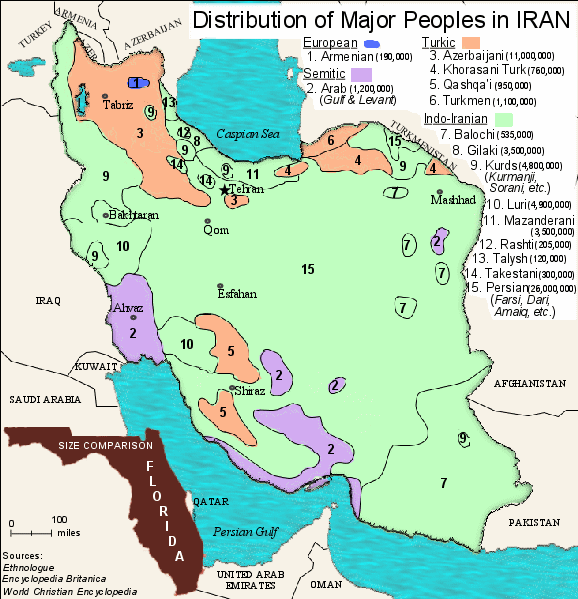
Shah Afshar, Foursquare Regional Coordinator for the Middle East, said in an interview, “This should cause any missiologist to wonder why (so many people from) the nation which had become a model for the rest of the fundamental Muslim world to emulate – the same country that introduced suicide bombing to the world – are now turning to Christ.”
This phenomenon didn’t take place through the efforts of foreign missionaries, Afshar said, because after the country’s Islamic revolution of the late 1970's, all foreign missionaries were expelled from Iran.
Much of the evangelism of Muslims in Iran, Afshar said, has been done through shortwave radio and satellite television programs by Iranians who came to know Christ while outside their own country.
“With the revolution there also came a mass exodus of almost 6 million Iranians out of Iran to various countries around the world,” Afshar said. “It was there that for the first time many of these exiles were exposed to the gospel, and eventually a great number of them became followers of Jesus—50,000 by some estimates. It is because of these exiled believers and other faithful ones who never left Iran that (this) phenomenon is unfolding.”
Understandably, the Iranian authorities are concerned that their influence is waning. One employee of the country’s Ministry of Education, Hasan Mohammadi, hired to teach Islamic precepts to high school and university students in the country run by Islamic clerics, encouraged his audience to “Be aware young men; safeguard your beloved Shiite Islam.”
When issuing this admonition at a gathering of senior high school students in the north of the Iranian capital in April 2004, Afshar said Mohammadi underscored his point by saying, “Unfortunately, on average, every day fifty Iranian girls and boys convert secretly to Christian denominations in our country.”
According to Afshar, reportedly quoting from a comment made by the 47-year-old cleric and heard by Hamad Egbali, whose son Ali was in the audience, Mohammadi “unknowingly admitted the defeat of the Islamic Republic of Iran as a theocratic regime in promoting its Islam.”
Afshar said it was average everyday believers who evangelized these exiles. He said, “For example, over thirty years ago, a group of what were then called ‘Jesus Freaks,’ took the time to share the love of God with (me), which eventually led to my salvation. Because of that simple act of obedience and love, today thousands of Iranian Muslims have heard the contextualized gospel in their own language, which has caused many of them to come to the Lord.”
Afshar said those individuals who shared Jesus Christ with him were not trained in Islamic evangelism. But they “were willing to reach out to a scared lonely Muslim boy for Christ’s sake. Their motive was not as much converting me as it was just to love and accept me. And today the Lord is asking the American believers to do the same.”
Afshar said he is issuing a challenge to believers worldwide.
“Next Sunday ask your church how many of them know any Muslims,” Afshar said. “You might be surprised to find out the number of people at your church who work, go to school, or are neighbors to these immigrants whom God has brought to our doorsteps. We have a mandate from Christ himself to go into the whole world.”
Afshar said for those wanting some formal training he suggests organizing a seminar at church focusing on successful evangelism to Muslims. Afshar said in addition that Foursquare Missions International staff are also happy to provide assistance. Back to Top
Agency Profile:
Iranian Christians International
Iranian Christian International, Inc. (ICI) ministers to the approximately 8 million Iranians and Afghans living outside their countries today. ICI works closely with many mission organizations, churches and Christian workers. The ICI ministry is sustained through the prayers,
contributions and commitment of those who share this vision.
ICI endeavors to fulfill the Great Commission by carrying out ministries of evangelism and discipleship to Iranians, Afghans and other Persian speaking peoples. ICI accomplishes this through intercessory prayer, one-on-one evangelism, literature development and distribution, networking with believers and organizations, establishing and nurturing local Bible study groups, fellowships and churches, sponsoring conferences, assisting refugees, and equipping the church at large to reach Muslims with the Gospel.
phone: (719) 596-0010
fax: (719) 574-1141
website: www.farsinet.com/ici
Opportunity:
Get Help for Retiring into Missions
Finishers Forum June 10 - 11 (Friday - Saturday) 2005
Village Seven Presbyterian Church, Colorado Springs
This conference is a safe place to reflect how, where and when the Lord may be leading you to invest time in Kingdom service. The Finishers Project represents over 80 North American organizations that have over 20,000 opportunities in missions. Many options will fit you and your spouse — short-term, part-time, part of a year and, of course, full-time.
You will meet like-minded attendees from your own community in a similar life-stage. Like you, they are considering options to make a difference in the world with the rest of their adult years.
This conference will provide insight and tools to assist in your life-journey as you cross into your second-half.
Plenary sessions show how we can join in fulfilling the commission to disciple the nations.
Breakout sessions will focus on key life-issues, such as seeing that your skills, giftedness and passions can be used by God among the nations.
www.finishers.org/colorado/reg_co.php
Resource:
Learn About Islam in Just Fourteen Pages
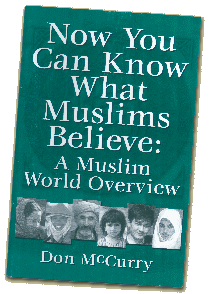
Order From:
4164 Austin Bluffs Pkwy, #357, Colorado Springs, CO 80918
phone: (719) 597-0609, fax: (719) 597-0712
Book Review:
READING LOLITA IN TEHRAN: A Memoir in Books
by Azar Nafisi, Random House, NY (2003)
reviewed by Theresa Lynn Sidebotham
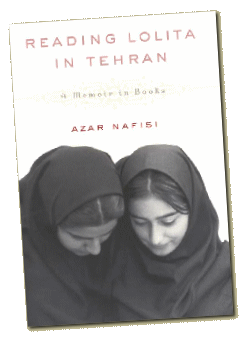 Although it’s a truism that literature
helps one understand life, Reading Lolita in
Tehran is about the interaction of
(forbidden) western literature with the
tyranny of the fundamentalist Muslim
revolution, and the impact both have on the
lives of women.
Although it’s a truism that literature
helps one understand life, Reading Lolita in
Tehran is about the interaction of
(forbidden) western literature with the
tyranny of the fundamentalist Muslim
revolution, and the impact both have on the
lives of women.
Azar Nafisi is an Iranian professor who chose to move back to Iran, after spending many years in the West, shortly before the revolution took place.
At first, she was able to teach in the university, but the environment became progressively more restrictive for women, including mandatory wearing of the veil. Eventually, she could no longer teach under the new regime. She invited some of her former women students to meet in a study group.
Lolita, by Vladimir Nabokov, is the story of a twelve year old who is raped by an older man (and blamed by him in the story). The women identified with it not only because the legal age of marriage for girls after the Revolution dropped to age nine, but because it is the story of “the confiscation of one individual’s life by another”(p. 33).
One of Prof. Nafisi’s students was arrested for sitting in a group of six girls and one boy in a garden. The girls (only) were subjected to a gynecological exam for virginity—twice—and given twenty-five lashes.
The Great Gatsby, by F. Scott Fitzgerald, was attacked in Prof. Nafisi’s classes at the university for its immorality, as the central theme was adultery. This took place during a period of rapid ideological change, arrests, and tyranny. Even many devout Muslim women resented all women’s being forced to wear the veil, because it stripped the true religious meaning from it.
Many Iranians were secular and were forced to cooperate with the regime. One of the important themes of this novel for Prof. Nafisi and her students was the loss of illusion.
The section on Henry James’ Daisy Miller describes the bombing during the war with Iraq, the sirens (but no shelters) and the terror and destruction. The theme of the book is the destruction of Daisy Miller for refusing to cooperate with the social norms in her society. The women in the study group admired her courage.
The girls in the class burlesqued the opening sentence of Jane Austen’s Pride and Prejudice by saying, “It is a truth universally acknowledged that a Muslim man, regardless of his fortune, must be in want of a nine-year-old virgin wife” (p. 257). Pride and Prejudice symbolized for them the very complicated relationships with men in the Islamic Republic. Prof. Nafisi was fortunate enough to have a loving (and Westernized) husband, but some of the girls had been through difficult and abusive relationships. It seemed almost impossible to have a relationship of equals, when the veil was “a mask behind which women were forced to hide”(p. 329).
Professor Nafisi pretended at times that her body disappeared and ceased to exist under the robe, as a way of coping with being dehumanized and with the body searches (pp. 167-168).
In this book, Iran comes across as a beloved and lovely country, with great charm and culture. However, life there became so miserable that eventually Prof. Nafisi and her family left Iran. She is now a professor at Johns Hopkins Uiversity.
This book shows the uniqueness of Iranian culture, which is quite different from other Muslim countries, and yet the tyrannical sameness of fundamentalist Islam, which strips freedom and individuality from people. Through the study of literature, it shows how people still long to be free.
Opportunity:
Muslim Studies Training Programs in 2004
Organization Program/Course Dates Horizons International
Boulder, CO
(303) 442-3333
www.horizonsinternational.orgIslam & Muslims: Foundations for Understanding
Christianity & Ialam: Similarities and Differences
Breaking Strongholds: Kingdom Clash & Power Encounter
Transforming Muslims and Restoring the Image of God
6 - 12 Jun
13 - 19 Jun
20 - 26 Jun
27 Jun - 1 Jul
Summer Inst of Muslim Studies
The Hideaway, Colo Spgs, CO
(2 classes each week)
(719) 597-0609
www.mtmsims.orgComparative Study of Islam & Christianity
Learning to Answer Muslim Attacks on Christian Faith
Evangelism & Church Planting among Persian Speakers
Power Encounter in Dealing with Occultic Islam
An Overview of Contextualization and Church Planting
House Church Planting among Mid-East Muslims
Church Multiplication Movements in the Muslim World
Correlation between Church Growth and Persecution11 - 15 Jul
11 - 15 Jul
18 - 22 Jul
18 - 22 Jul
25 - 29 Jul
25 - 29 Jul
1 - 5 Aug
1 - 5 AugZwemer Center for Muslim Studies
CIU, Columbia, SC
1-800-777-2227
www.ciu.edu/seminary/muslimstudiesIntro to Islam
Folk Islam
Approaches to Islam
Revelation, Qur'an, and Muslim Traditions4 - 8 Jul
12 - 15 Jul
18 - 22 Jul
25 - 29 JulSouthwestern Baptist Theo. Sem.
(817) 923-1921
www.swbts.eduOne & Two Week Short Courses
at the World Mission Center in Ft. WorthMay & Jun People of the Book
(703) 978-2506
faysal@sharifclan.comConference for Muslim Background Believers
in the Wa. D.C. metro area4 - 6 Sep Fuller Theo. Sem.
1-800-235-2222week long short courses
in Pasadena, CAJun & Jul Arab World Ministries
(781) 334-4072
www.awm.orgSummer Inst on Islam in Philadelphia
Intro to Islam & Cross-Cultural Communication26 May - 4 Jun CHRISTAR
1-800-755-7955
www.christar.org/stop.htmSummer Training & Outreach Prog (STOP)
in the New York Metro area
classroom in morning, afternoon field application3 Jul - 2 Aug Crescent Project
1-888-446-5457
www.crescentproject.orgSahara Challenge
in conjunction with Wycliffe, Orlando, FL
1 wk orientation, short trip in USA or overseas28 May - 4 Jun Assemblies of God World Missions
Center for Ministry to Muslims
Springfield, MO
(417) 866-3313
www.cmmequip.orgIntro to Islam
Intro to Islam
Muslim/Christian Theological Issues
4 - 8 July
30 Aug - 15 Sep
17 - 21 October
Seminars and Workshops that Will Come to You
Organization Program Contact Ministry to Muslims Introduction to Islam 1-719-597-0609 Zwemmer Center for Muslim Studies
Columbia International UniversityMuslim Awareness Seminars
and Extension Courses1-800-777-2227 Crescent Project Sharing the Hope
1 Day Seminars1-888-446-5457
www.crescentproject.orgHorizons Interational Reach out to Muslims Seminars 1-303-442-3333 Operation Reveille Insights on Testimony
for Christians in the Military1-719-572-5908
People of the Book Lessons on Islam
and Cross-Cultural Understanding1-703-978-2506
faysal@sharifclan.comThe Navigators lectures by Dr. Nabeel T. Jabbour 1-719-578-8973
nabeel@nabeeljabbour.comGood News for the Crescent World
(GNFCW)Seminars on Islam
and Reaching out to Muslims1-817-275-3413
www.gnfcw.comCaleb Project Encountering the World of Islam www.www.encounteringislam.org
303.730.4170 ext 302Operation Mobilization, UK Markaz Tehquiq Al-Haq MTH@care4free.net